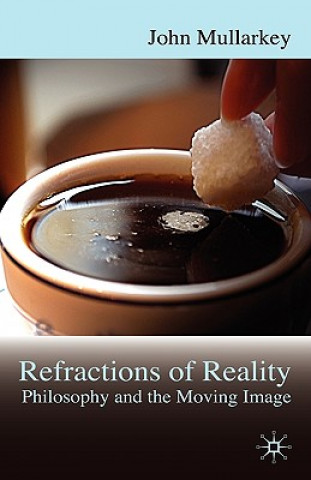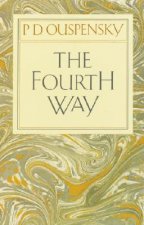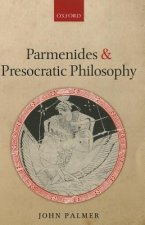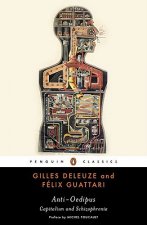
Code: 04550946
Refractions of Reality: Philosophy and the Moving Image
by John Mullarkey
Why is film becoming increasingly important to philosophers? Is it because it can be a helpful tool in teaching philosophy, in illustrating it? Or is it because film can also think for itself, because it can create its own philoso ... more
- Language:
 English
English - Binding: Hardback
- Number of pages: 286
Publisher: PALGRAVE MACMILLAN, 2008
- More about this

70.68 €

Low in stock at our supplier
Shipping in 12 - 17 days
Potřebujete více kusů?Máte-li zájem o více kusů, prověřte, prosím, nejprve dostupnost titulu na naši zákaznické podpoře.
Add to wishlist
You might also like
-

The Chinese Takeout Cookbook
28.80 € -8 % -

A Bright and Terrible Sword
37.99 € -

ANGELEYES M
13.99 € -

Old Hickory Lake Water Safety Coloring Book
10.51 € -

Die Bucklige Welt
21.85 € -

Kytarová první třída + CD
20.73 € -18 %
Give this book as a present today
- Order book and choose Gift Order.
- We will send you book gift voucher at once. You can give it out to anyone.
- Book will be send to donee, nothing more to care about.
More about Refractions of Reality: Philosophy and the Moving Image
You get 175 loyalty points
 Book synopsis
Book synopsis
Why is film becoming increasingly important to philosophers? Is it because it can be a helpful tool in teaching philosophy, in illustrating it? Or is it because film can also think for itself, because it can create its own philosophy? In fact, a popular claim amongst film philosophers is that film is no mere handmaiden to philosophy, that it does more than simply illustrate philosophical texts: rather, film itself can philosophise in direct audio-visual terms. Approaches that purport to grant to film the possibility of being more than illustrative can be found in the subtractive ontology of Alain Badiou, the Wittgensteinian analyses of Stanley Cavell, and the materialist semiotics of Gilles Deleuze. In each case there is a claim that film can think in its own way. Too often, however, when philosophers claim to find indigenous philosophical value in film, it is only on account of refracting it through their own thought: film philosophizes because it accords with a favored kind of extant philosophy. Refractions of Reality: Philosophy and the Moving Image is the first book to examine all the central issues surrounding the vexed relationship between the film image and philosophy. In it, John Mullarkey tackles the work of particular philosophers and theorists (Zizek, Deleuze, Cavell, Bordwell, Badiou, Branigan, Ranciere, Frampton, and many others) as well as general philosophical positions (Analytical and Continental, Cognitivist and Culturalist, Psychoanalytic and Phenomenological). Moreover, he also offers an incisive analysis and explanation of several prominent forms of film theorizing, providing a metalogical account of their mutual advantages and deficiencies that will prove immensely useful to anyone interested in the details of particular theories of film presently circulating, as well as correcting, revising, and revisioning the field of film theory as a whole. Throughout, Mullarkey asks whether the reduction of film to text is unavoidable. In particular: must philosophy (and theory) always transform film into pretexts for illustration? What would it take to imagine how film might itself theorize without reducing it to standard forms of thought and philosophy? Finally, and fundamentally, must we change our definition of philosophy and even of thought itself in order to accommodate the specificities that come with the claim that film can produce philosophical theory? If a 'non-philosophy' like film can think philosophically, what does that imply for orthodox theory and philosophy?
 Book details
Book details
Book category Knihy po anglicky Humanities Philosophy History of Western philosophy
70.68 €
- Full title: Refractions of Reality: Philosophy and the Moving Image
- Author: John Mullarkey
- Language:
 English
English - Binding: Hardback
- Number of pages: 286
- EAN: 9780230002470
- ISBN: 0230002471
- ID: 04550946
- Publisher: PALGRAVE MACMILLAN
- Weight: 533 g
- Dimensions: 216 × 140 × 23 mm
- Date of publishing: 11. December 2008
Trending among others
-

Meditations
9.08 € -24 % -

The Myth of Sisyphus
8.06 € -

Meditations
20.01 € -21 % -

Aphorisms on Love and Hate
3.57 € -24 % -

Why I Am so Clever
3.87 € -18 % -

Meditations
14.91 € -23 % -

Simulacra and Simulation
19.09 € -17 % -

Either/Or
19.40 € -

Existentialism Is a Humanism
9.18 € -19 % -

Thus Spoke Zarathustra
9.80 € -24 % -

The Trouble With Being Born
13.17 € -19 % -

Ride the Tiger
21.24 € -19 % -

Nietzsche
24 € -8 % -

Logic of Desire
47.19 € -

Myth of Sisyphus
11.13 € -23 % -

History of Western Philosophy
25.63 € -

Human, All Too Human & Beyond Good and Evil
5.92 € -21 % -

Fear and Trembling
10.61 € -

On War
5.51 € -26 % -

Fragments
14.19 € -13 % -

How to Win an Argument
17.77 € -7 % -

Fourth Way
16.95 € -20 % -

Lyotard and the Political
61.39 € -

Brief History of Everything (20th Anniversary Edition)
16.85 € -21 % -

Dostoevsky, Kierkegaard, Nietzsche and Kafka
18.48 € -4 % -

Parmenides and Presocratic Philosophy
83.66 € -

Norton Anthology of Western Philosophy: After Kant
91.22 € -4 % -

Nietzsche: A Very Short Introduction
10.10 € -22 % -

Nausea
11.13 € -23 % -

Letters from a Stoic
12.35 € -15 % -

The Symposium
9.29 € -18 % -

Beyond Good and Evil
11.13 € -23 % -

At The Existentialist Cafe
12.76 € -24 % -

Discourses, Fragments, Handbook
11.64 € -19 % -

Critique of Pure Reason
18.48 € -21 % -

Leviathan
9.49 € -16 % -

Spell of the Sensuous
17.05 € -12 % -

Discourses and Selected Writings
10.92 € -24 % -

On the Shortness of Life
8.57 € -18 % -

Phenomenology of Spirit
34.93 € -

Think
12.25 € -23 % -

Nicomachean Ethics
6.12 € -18 % -

World as Will and Representation, Vol. 1
25.43 € -12 % -

Socrates' Defence
3.57 € -24 % -

Anti-Oedipus
22.98 € -5 % -

World as Will and Representation, Vol. 2
25.94 € -16 % -

Meditations of Marcus Aurelius
8.16 € -12 % -

Consolations of Philosophy
12.86 € -24 % -

Queer Phenomenology
27.68 € -6 %
Osobný odber Bratislava a 2642 dalších
Copyright ©2008-24 najlacnejsie-knihy.sk Všetky práva vyhradenéSúkromieCookies


 21 miliónov titulov
21 miliónov titulov Vrátenie do mesiaca
Vrátenie do mesiaca 02/210 210 99 (8-15.30h)
02/210 210 99 (8-15.30h)